中职英语导学案Book1Unit9 Lesson 3-4
- 格式:doc
- 大小:28.50 KB
- 文档页数:2
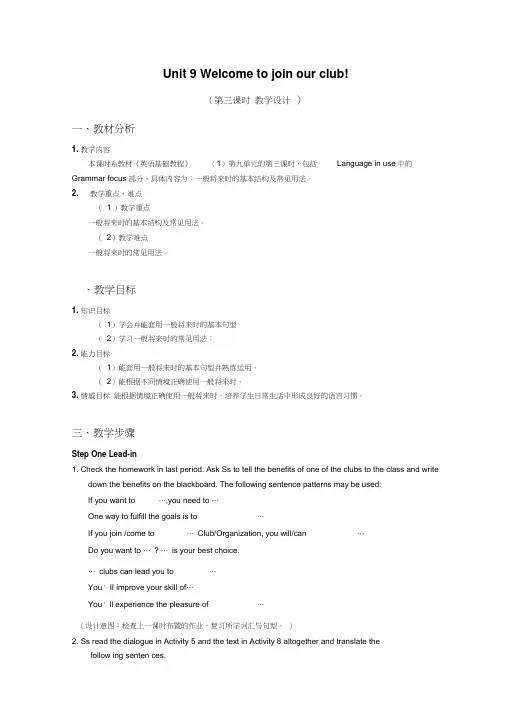
Unit 9 Welcome to join our club!(第三课时教学设计)一、教材分析1. 教学内容本课时系教材《英语基础教程》(1)第九单元的第三课时,包括Language in use中的Grammar focus 部分,具体内容为:一般将来时的基本结构及常见用法。
2. 教学重点、难点(1 )教学重点一般将来时的基本结构及常见用法。
(2)教学难点一般将来时的常见用法。
、教学目标1. 知识目标(1)学会并能套用一般将来时的基本句型(2)学习一般将来时的常见用法:2. 能力目标(1)能套用一般将来时的基本句型并熟练运用。
(2)能根据不同情境正确使用一般将来时。
3. 情感目标能根据情境正确使用一般将来时,培养学生日常生活中形成良好的语言习惯。
三、教学步骤Step One Lead-in1. Check the homework in last period. Ask Ss to tell the benefits of one of the clubs to the class and writedown the benefits on the blackboard. The following sentence patterns may be used:If you want to …,you need to …One way to fulfill the goals is to …If you join /come to … Club/Organization, you will/can …Do you want to … ? … is your best choice.… clubs can lead you to …You' II improve your skill of…You' ll experience the pleasure of …(设计意图:检查上一课时布置的作业,复习所学词汇与句型。
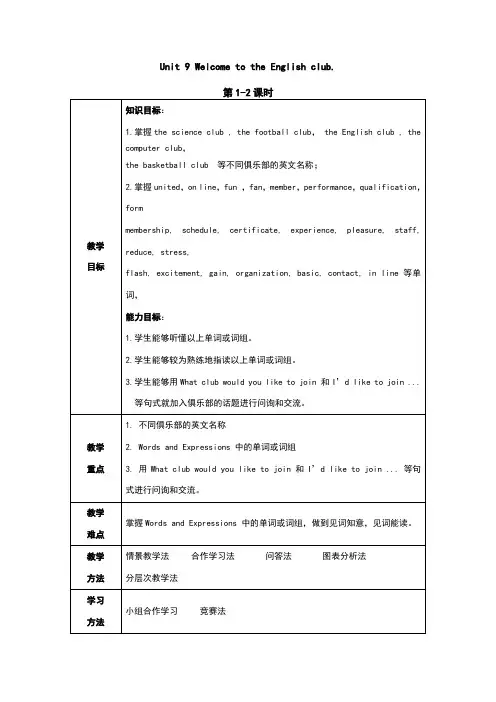
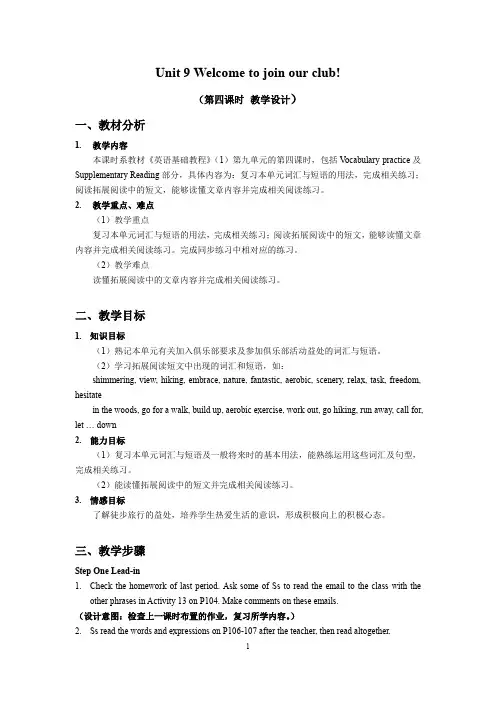
Unit 9 Welcome to join our club!(第四课时教学设计)一、教材分析1.教学内容本课时系教材《英语基础教程》(1)第九单元的第四课时,包括V ocabulary practice及Supplementary Reading部分,具体内容为:复习本单元词汇与短语的用法,完成相关练习;阅读拓展阅读中的短文,能够读懂文章内容并完成相关阅读练习。
2.教学重点、难点(1)教学重点复习本单元词汇与短语的用法,完成相关练习;阅读拓展阅读中的短文,能够读懂文章内容并完成相关阅读练习。
完成同步练习中相对应的练习。
(2)教学难点读懂拓展阅读中的文章内容并完成相关阅读练习。
二、教学目标1.知识目标(1)熟记本单元有关加入俱乐部要求及参加俱乐部活动益处的词汇与短语。
(2)学习拓展阅读短文中出现的词汇和短语,如:shimmering, view, hiking, embrace, nature, fantastic, aerobic, scenery, relax, task, freedom, hesitatein the woods, go for a walk, build up, aerobic exercise, work out, go hiking, run away, call for, let … down2.能力目标(1)复习本单元词汇与短语及一般将来时的基本用法,能熟练运用这些词汇及句型,完成相关练习。
(2)能读懂拓展阅读中的短文并完成相关阅读练习。
3.情感目标了解徒步旅行的益处,培养学生热爱生活的意识,形成积极向上的积极心态。
三、教学步骤Step One Lead-in1.Check the homework of last period. Ask some of Ss to read the email to the class with theother phrases in Activity 13 on P104. Make comments on these emails.(设计意图:检查上一课时布置的作业,复习所学内容。
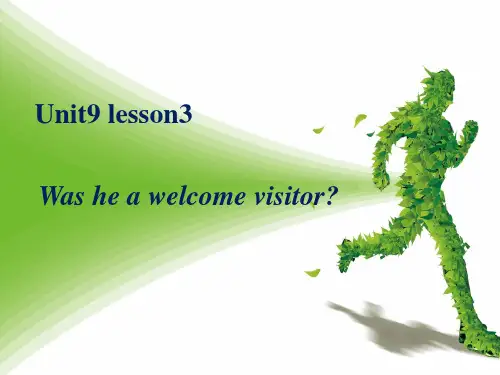
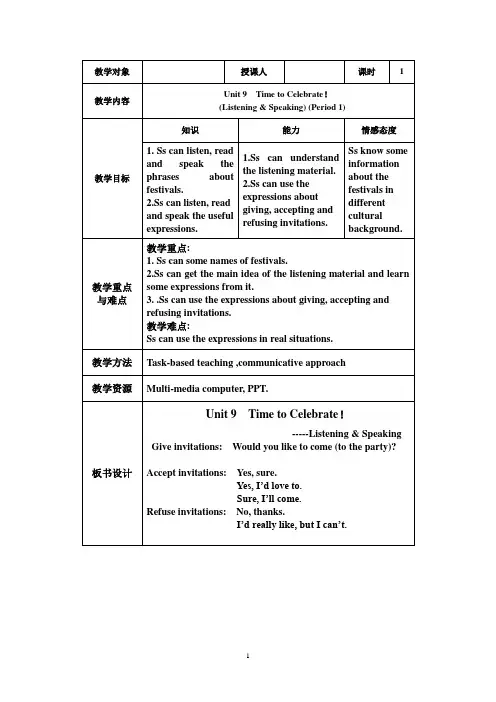
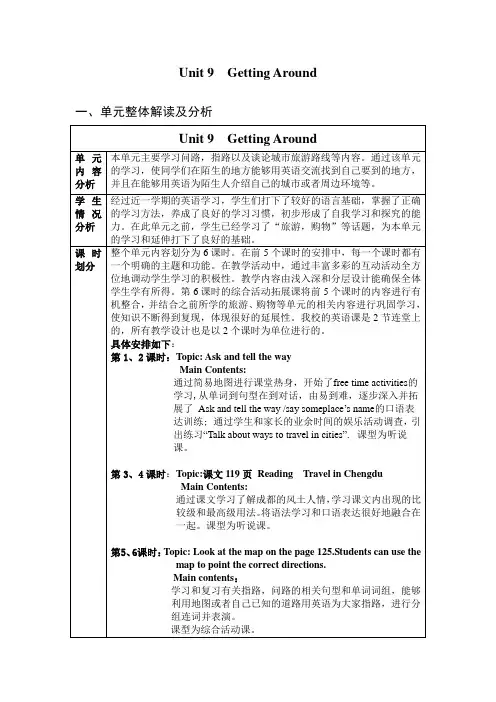
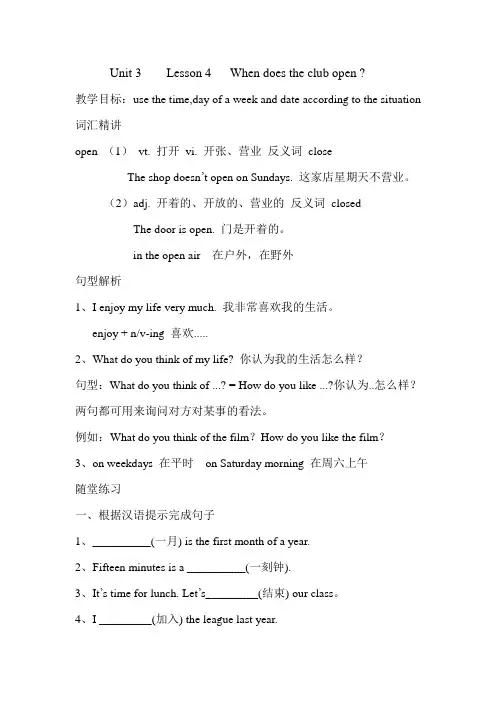
Unit 3 Lesson 4 When does the club open ?教学目标:use the time,day of a week and date according to the situation 词汇精讲open (1)vt. 打开vi. 开张、营业反义词closeThe shop doesn’t open on Sundays. 这家店星期天不营业。
(2)adj. 开着的、开放的、营业的反义词closedThe door is open. 门是开着的。
in the open air 在户外,在野外句型解析1、I enjoy my life very much. 我非常喜欢我的生活。
enjoy + n/v-ing 喜欢.....2、What do you think of my life? 你认为我的生活怎么样?句型:What do you think of ...? = How do you like ...?你认为..怎么样?两句都可用来询问对方对某事的看法。
例如:What do you think of the film?How do you like the film?3、on weekdays 在平时on Saturday morning 在周六上午随堂练习一、根据汉语提示完成句子1、__________(一月) is the first month of a year.2、Fifteen minutes is a __________(一刻钟).3、It’s time for lunch. Let’s_________(结束) our class。
4、I _________(加入) the league last year.5、He will __________(到达) on Monday.6、When does the train ______(离开)?7、It’s time to _____( 开始) the game.二、根据情景补全对话1、—______ ______ is it now?—It’s eight ________.2、—_______ _______ is it today?—It’s Friday.3、—_______ _______ date today?—It’s August 15th.4、—_______ does the library open?—It opens at 6:00 am.5、—What ______ of the football game is it?—It’s May 4th.三、根据文意完成短文I ______ my life very much. _____ weekdays, I go to school at 7:30. At 5:45pm,it’s time ____ ______ baketball with my friends. _____ the evening, I watch TV _____ half an hour. I do my homework _____ 8:00pm _____9:30pm and sometimes ______ _____ music. ____ Saturday morning, I clean my room and do some _________. I _______ the Net for one hour ____ the afternoon. What do you _________of my life?。
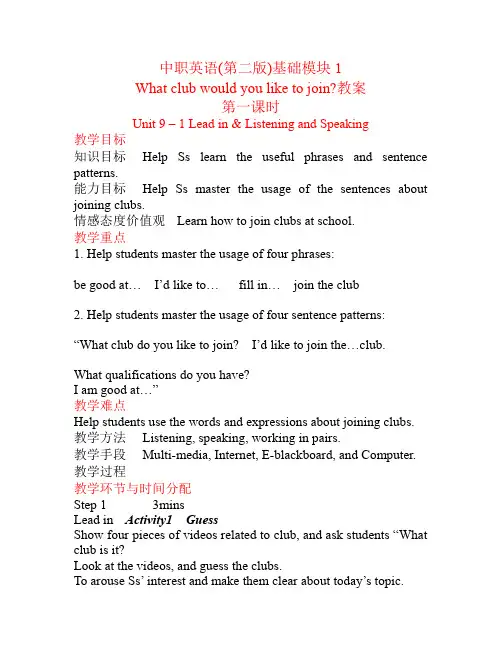
中职英语(第二版)基础模块1What club would you like to join?教案第一课时Unit 9 – 1 Lead in & Listening and Speaking教学目标知识目标Help Ss learn the useful phrases and sentence patterns.能力目标Help Ss master the usage of the sentences about joining clubs.情感态度价值观Learn how to join clubs at school.教学重点1. Help students master the usage of four phrases:be good at… I’d like to… fill in… join the club2. Help students master the usage of four sentence patterns: “What club do you like to join? I’d like to join the…club.What qualifications do you have?I am good at…”教学难点Help students use the words and expressions about joining clubs. 教学方法Listening, speaking, working in pairs.教学手段Multi-media, Internet, E-blackboard, and Computer.教学过程教学环节与时间分配Step 1 3minsLead in Activity1 GuessShow four pieces of videos related to club, and ask students “What club is it?Look at the videos, and guess the clubs.To arouse Ss’ interest and make them clear about today’s topic.Step 2 10minsPre-listening Activity 2 Match1Ask Ss to match the new words according to the pictures. Activity 3 Learn2Lead Ss to learn and match the new phrases, and then check the answers.Activity 4 Finish3Lead students to finish the blanks according to the pictures. Match, learn and read the new words after teacher.Step 3 15minsWhile-listeningPlay the tape, lead Ss to finish two kinds of listening training :Activity 5 Listen1Listen and complete2Listen and chooseListen to the tape and finish two kinds of listening exercises with the help of teacher.Step4 Post –Listening 10minsActivity6 Read1Ask Ss to read after teacher.2Ask Ss to read in pairs3Ask Ss to read in groupsActivity7 Drill1Ask Ss to Finish the application forms according to the pictures and information in groups.2Lead Ss to do the substitution drills according to the outline. Step 5 Role PlayActivity8 Role playCreate situation, and ask the Ss to finish the task according to the requirements, and then ask each group to perform their Club Interview.Step 6 .Group Assessment & Self-check 5minsActivity9 Assessment1. Group AssessmentAsk Ss to give each group a score according to the standard, and choose “The Best Group”.2. Self-checkAsk Ss to give themselves a score according to the contents in the sheet. Read the Assessment sheet and evaluate each group, and then pick out “The Best Group”Step 7 Homework2minsWrite down an Art Club Interview dialogue with at least 10 sentences by using the key patterns.Shoot a short video about the Art Club Interview, and upload to the BB Platform.板书设计Unit 9. What club would you like to join?Key phrases: Key structures:be good at What club do you like to join?I’d like to I’d like to join the…club.fill in What qualifications do you have?join the club I am good at…第二课时Unit 9 – 2 Reading and writing教学目标知识目标Help Ss understand the words and expression in posters能力目标Help Ss understand the main ideas of posters情感态度价值观Join the clubs and be active教学重点Understand the structures and expressions about joining a club.教学难点Suggest a proper clubs with useful expressions according to the given situation.教学方法Reading, writing, discussing, working in groups.教学手段Multi-media, blackboard.教学过程教学环节与时间分配Step 1 3minsLead in Activity1 GuessShow four pieces of videos related to club, and ask students “What club is it?Step 2 8minsPre-listening Activity 2 MatchAsk Ss to match the new words according to the pictures. Activity 3 LearnLead Ss to learn and match the new phrases, and then check the answers.Activity 4 FinishLead students to finish the blanks according to the pictures. Step 3 15minsWhile-listeningPlay the tape, Lead Ss to finish two kinds of listening training :Activity 5 Listen1.Listen and complete2.Listen and chooseStep4 Post – Listening 10minsActivity6 Read1.Ask Ss to read after teacher.2.Ask Ss to read in pairs3.Ask Ss to read in groupsActivity7 Drill1.Ask Ss to Finish the application forms according to thepictures and information in groups.2.Lead Ss to do the substitution drills according to the outline. Step 5 Role Play 5minsActivity8 Role playCreate situation, and ask the Ss to finish the task according to the requirements, and then ask each group to perform their ClubInterview.Step 6.Group Assessment &Self-check 3minsActivity9 Assessment1. Group AssessmentAsk Ss to give each group a score according to the standard, and choose “The Best Group”.2. Self-checkAsk Ss to give themselves a score according to the contents in the sheet.Step 7 Homework1min1.Write down an Art Club Interview dialogue with at least 10 sentences by using the key patterns.2.Shoot a short video about the Art Club Interview, and upload to the BB Platform.板书设计Unit 9. What club would you like to join?Key phrases: Key structures:be good at What club do you like to join?I’d like to I’d like to join the…club.fill in What qualifications do you have?join the club I am good at…第三课时Unit 9 – 3 Language in use & Unit Task教学目标知识目标1.Help Ss learn the simple future tense: will/be going to2.Help Ss review the key parts in this unit能力目标1. Help Ss master the usage of the simple future tense2. Help Ss set up a club with group members.情感态度价值观Learn to express ideas and cooperate with other classmates教学重点1. Learn the sentence structures of will/be going to2. Understand the usage of the simple future tense教学难点1. Use will/be going to sentences correctly2. Express the future plans by using will/be going to sentences教学方法Discussing, working in group教学手段Multi-media, blackboard教学过程教学环节与时间分配Step 1 3minsLead in1) Shows a video show, ask the Ss to tick the right ones.2) Check the key.3) Group feedback.Step 2 12minsPresentation•She will sing English songs.•She will listen to English music.•She will watch English TV programs.Ask the Ss to find out the same structure in these sentences.→will + 动词原形do描述将来发生的事情•She will watch English TV programs.•I/You/She/He/It/We/You/They will watchEnglish TV programs.Will I/you/she/he/we/you/they watch EnglishTV programs?→will +主语+ 动词原形do …?What will you/he/she/they do in the club?- I / We/ He / She /They will …→ Wh-/H-(特殊疑问词)+ 主语+ do…?常见的时间状语:next week/year tomorrowthe coming Monday tonightthis afternoon in the futurein a few minutes in five years对比句型I will/shall join the English club.I am going to join the English club.She/He is going to join the English club.We /They are going to join the English club.be (am is are) going to do计划、打算做某事-Be (Am Is Are) + 主语+going to do…?-Yes, 主语+ be (am is are).-No, 主语+ be (am is are) +not.Wh-/H-(特殊疑问词)+主语+going to do?Step 3 Practice15minsActivity 1Ask Ss to fill in blanks.Activity 2Ask Ss to do pair-works with the given pictures and clued phrases. Activity 3Ask Ss to make short new dialogues with the flash pictures.Step 4 Unit task 10minsAsk Ss to list the names of clubs and qulifications of members. Do the interviews in groups.Step 5 Consolidation 3minsSummarize the sentence structures and usage of will/be going to together.Step 6 Homework 2mins1. Finish off the grammar exercises on WB P67 Ex 5; P69 Ex 92. Design their future plans on computer.板书设计Unit 9 The Simple Future Tensewill/ be going to。
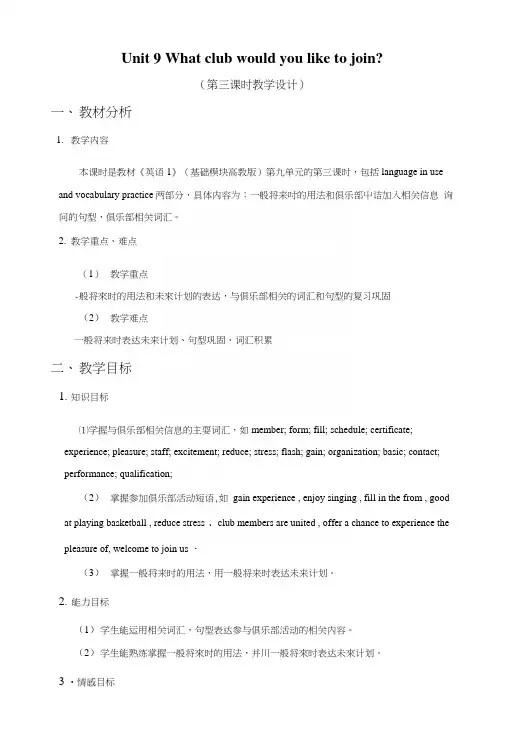
Unit 9 What club would you like to join?(第三课时教学设计)一、教材分析1.教学内容本课时是教材《英语1》(基础模块高教版)第九单元的第三课时,包括language in use and vocabulary practice两部分,具体内容为:一般将来吋的用法和俱乐部屮诘加入相关信息询问的句型,俱乐部相关词汇。
2.教学重点、难点(1)教学重点-般将來时的用法和未來计划的表达,与俱乐部相关的词汇和句型的复习巩固(2)教学难点一般将来时表达未来计划、句型巩固、词汇积累二、教学目标1.知识目标⑴学握与俱乐部相关信息的主耍词汇,如member; form; fill; schedule; certificate;experience; pleasure; staff; excitement; reduce; stress; flash; gain; organization; basic; contact;performance; qualification;(2)掌握参加俱乐部活动短语,如gain experience , enjoy singing , fill in the from , good at playing basketball , reduce stress 、club members are united , offer a chance to experience the pleasure of, welcome to join us ・(3)掌握一般将来时的用法,用一般将来时表达未来计划。
2.能力目标(1)学生能运用相关词汇,句型表达参与俱乐部活动的相关内容。
(2)学生能熟练掌握一般将來时的用法,并川一般将來时表达未來计划。
3 •情感目标学生能根据口己的梦想,制定未来的计划,树立学习的冃标。
三、教学步骤Step one Lead-in (6m)1.Have a comment on the students9 poster. Show some beautiful posters in class・(设计意图:及时评价学生作业,肯定优秀作品,促使学生的学习积极性的提高)2.Have students think about what they will do in the English club and give possible answers. Find out the same structure in these sentences・ They are used to express future activities.English club We will sing English songs・We will listen to English music.We will watch English movies.We will watch English TV programs.We will play English games・We will read English magazines・We will have a competition for English speech・(设计意图:由简单的活动阐述将来会发生的事,对将来事情的主观臆断是将来时态的一种用法之一:Will+动词原形do)Step Two language in use (20m)3.Contrast: give students 4 groups of sentences, then have students talk about the similarities.(1 )What club do you join?What club are you going to join?(2)Tom work in the hospital.Tom is going to work in the hospital.(3)1 do my homework after class. | 〉be going to do (表将来)fm going to do my homework after class ・(4)It rains.It is going to rain.(设计意图:通过内容相同,时态不同的句子相互比较,对比鲜明,学生容易区别其不同之处,掌握一般将来时态的第二种表达be(am is are)going to do,也是计划打算做的事情即将来时态的第二种用法)4.Activity 19 Talk and write: Have students talk about three things they will do after class. Then exchange ideas with their partner.(l)Will you watch TV after class?Yes, I will. / No, I worT匸IT1 do my homework.What are you going to do after class?First, I will---/Fm going to…Next, I will・・・/I'm going to…Then, I will…/IF going to…(2)What is he/she going to do after class?He/she is going lo…(3)What are they going to do after class?They are going to…(4)What will you/he/she/they do after class?I/We/ He / She /They will ...Will you/he/she/they ...?Yes, I/we/he/she/they will.No, I/we/he/she/they wont(设计意图:通过归纳与对比,加深学生印象,使知识结构清晰,便于学生掌握。
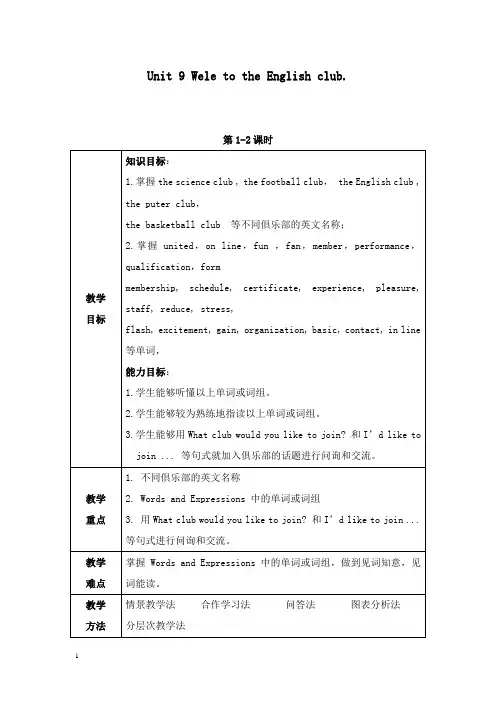
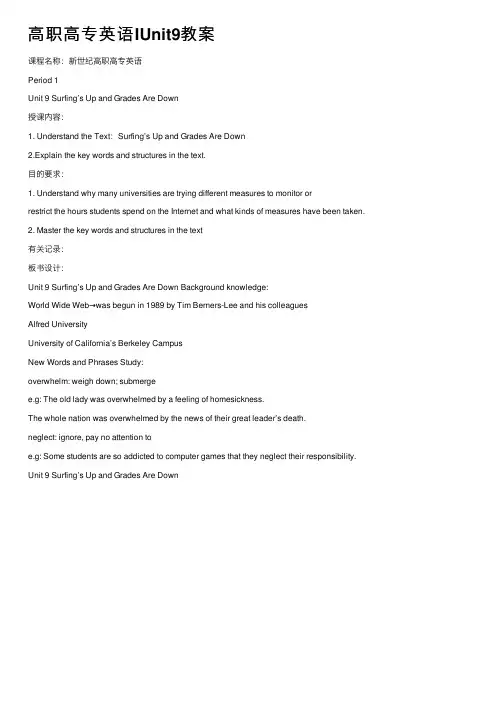
⾼职⾼专英语IUnit9教案课程名称:新世纪⾼职⾼专英语Period 1Unit 9 Surfing’s Up and Grades Are Down授课内容:1. Understand the Text:Surfing’s Up and Grades Are Down2.Explain the key words and structures in the text.⽬的要求:1. Understand why many universities are trying different measures to monitor orrestrict the hours students spend on the Internet and what kinds of measures have been taken.2. Master the key words and structures in the text有关记录:板书设计:Unit 9 Surfing’s Up and Grades Are Down Background knowledge:World Wide Web→was begun in 1989 by Tim Berners-Lee and his colleaguesAlfred UniversityUniversity of California’s Berkeley CampusNew Words and Phrases Study:overwhelm: weigh down; submergee.g: The old lady was overwhelmed by a feeling of homesickness.The whole nation was overwhelmed by the news of their great leader’s death.neglect: ignore, pay no attention toe.g: Some students are so addicted to computer games that they neglect their responsibility. Unit 9 Surfing’s Up and Grades Are DownI.Lead in( 15 minutes)Ask the students to discuss in pairs their opinions on computers and then ask some pairs to tell their opinions to the whole class.Q1: Do you agree that we are now living in the age of information and the Internet happens to be the most important source of information? Why?A: I agree. Because from many aspects, we can see how the Internet influences our lives by providing us with the information everyday. For example, at home….., at school…..Q2. What are the strong points of using computers and the Internet?A: With the help of computers and the Internet, we can get a great deal of information very quickly and conveniently.Q3. What about the weak points?A: Some people may get addicted to computer games and lose themselves in the Internet, so they may forget their responsibilities in real lives.II. Read in ( 65 minutes)1. Background Information ( 5 minutes)1) World Wide webThe WEB has become the leading information retrieval service of the Internet (the world-wide computer network). The Web gives users access to a vast array of documents that are connected to each other by means of hypertext or hypermedia links.The Web operat es within the Internet’s basic client-server format; servers are computer programs that store and transmit documents to other computers on the network when asked to, while clients are programs that request documents from a server as the user asks for them. Browser software allowsusers to view the retrieved documents.2) Tim Berners-LeeA graduate of Oxford University, England, Tim now holds the 3Com Founders chair at the Laboratory for Computer Science and Artificial Intelligence Lab (CSAIL) at the Massachusetts Institute of Technology (MIT). He directs the World Wide Web Consortium, an open forum of companies and organizations with the mission to lead the Web to its full potential.With a background of system design in real-time communications and text processing software development, in 1989 he invented the World Wide Web, Internet, an Internet-based hypermedia initiative for global information sharing, while working at CERN, the European Particle Physics Laboratory. He wrote the first web client (browser-editor) and server in 1990. He is the author of Weaving the Web, on the past, present and future of the Web.3) Alfred UniversityAlfred University is one of the most respected small universities in New York State and the nation, with colleges offering individualized academic programs in liberal arts and science, engineering, business, art and design.4) University of California’s Berkeley CampusBerkeley is the oldest campus of the University of California, situated in Berkeley, California on the east side of the San Francisco Bay, overlooking the Golden Gate. There are over 33,000 students enrolled and over 1,800 faculty.2. Developing vocabulary (30 minutes)1)counselor n.someone whose job is to help and support people with problems; advisore.g.: If you have any problems concerning your studies, you are suggested to turn to a counselor for advice. Extended words: counseling, counsel2) overwhelm v. weigh down; submergee.g. The Southeast Asian nations were overwhelmed by a Tsunami strike in December 2004.Extended words: overwhelming, overwhelminglyRelated words:conquer, overcome3)impose (on) v. place (sth. unwelcome or unpleasant) on sb./sth.; inflict sth.e.g. impose restrictions, limitations, restraints, etc. on tradeExtended words: imposing, imposingly, impositionRelated words: impress, enforce4) excessive adj. greater than what is normal or necessary; extremee.g. She died of excessive alcoholic drinking.e.g. Excessive cutting of trees has resulted in environmental deterioration.Extended words: excess, excessivelyRelated words: plentiful, abundant, extra5) orientation n. activity of orienting oneself; state of being orientatede.g. Universities usually give an orientation course to the freshmen so as to help them adapt to the new college life. Extended words:orient, oriental, orientate, disorientate, orientated6) pose v.cause sth. to arise, create or presente.g. Air pollution and traffic jam pose big problems for city planning.e.g. Terrorism poses a new problem for the security of the tourists in that city.7) neglect v.1) give no or not enough care or attention to (sb./sth.)e.g. As a mother, she will never neglect her duty to take care of her kids.2) fail or forget to do sth. esp. carelessly; leave undone (what one ought to do)e.g. He neglected to lock the door when he left the office.e.g. Some of the college students have become so absorbed in new computer games that they have neglected their coursework.Extended words: neglectful, neglected8) keep a close eye on: watch closelye.g. You need to keep a close eye on your suitcase when you travel around the country.9) move n. a step in a course of action towards a particular resulte.g. The company has taken a decisive move in the face of crisis.10) monitor v.1) make continuous observation of (sth.); record or test the operation of (sth.)e.g. After the patient underwent the operation, his lungs and heart condition was monitored by a machine.2) listen to and report on (foreign radio broadcasts and signals)e.g. He stayed up all night monitoring the radio signals across the coastline.11) lose oneself in sth.: be so involved in something that one does not notice anything elsee.g. The tourists had lost themselves so much in the beauty of the scenery there that they didn’t realize the danger of the impending storm.12)have…in common: share together or equallye.g. Though they are twin brothers, they have few interests in common.3.Detail study of the text (30 minutes)Paragraph One1) Comprehension QuestionsQ: What’s the problem put forward in this paragraph?A:More and more students are overwhelmed by computers.2) Main ideaIntroducing the problem of computers taking over college students’ lives.3) Phraseside effect: an unexpected or unpleasant result of a situation or evente.g. We shouldn’t ignore the negative side effect of the BBS.4) Difficult sentencesA growing number of students are letting computers overwhelm their lives.More and more students are having their lives controlled by computers.More and more students are losing themselves in this.More and more students are getting addicted to the use of computers.Paragraph Two1) Comprehension QuestionsQ: What do the counselors say about the way students use computers?A:They say that the students put too much emphasis on electronic relationships and neglect course work.2) Main ideaStudents put too much emphasis on electronic relationships and neglect course work and some even have been cheated out of money by virtual friends.Paragraph Three1) Comprehension QuestionsQ: Why is the Internet so attractive to students according to campus officials?A: Because it opens a door to a vast new realm of learning and research.2) Main ideaInternet is attractive to students because it is a safe and easy to communicate through Internet.3) Sentence structurehave trouble (in) doing something: have difficulty (in) doing somethinge.g. The old lady had trouble remembering the combination lock code.4) Difficult sentencesBut for students having trouble establishing social ties at large universities, or who are on their own, unsupervised, and facing adult pressures for the first time, it also poses many new risks.But for students who have difficulty forming social relationships at big universities, or are now living away from their parents for supervision and suffering from adult pressures as university students, the excessive use of computers causes many new risks.Paragraph Four1) Comprehension QuestionsQ: What has been done by some universities concerning the problem mentioned in the second paragraph?A: Some universities are restricting the time students spend on campus computers.2) Main ideaUniversities are taking different measures to solve the problems mentioned.Paragraph Five and Six1) Comprehension QuestionsQ: What did Alfred University decide to examine?A: It decided to examine what common features the students who had dropped out lastsemester had.Q: What did Connie Bechman find out?A: She discovered half of the students who dropped out spent as much as six hours a day on computer games or the Web.2) Main ideaAlfred University examined the common features of the students who had dropped out last semester and found that half of them spent too much time on computer games or the Web.3) Phrasesdrop out: stop attending or taking parte.g. The young man dropped out of college to go into business.Paragraph Seven1) Comprehension QuestionsQ: What will Alfred do to the freshmen the next semester?A: The freshmen will be told about the dangers of heavy computer use immediately after they enter school.2) Main ideaFreshmen in Alfred University will be told about the danger of heavy computer use and a full-time, professional counselor will be assigned to each computer room to watch for late night computer addicts.III. Exercise ( 10 minutes)Practice Ex. IIV. Assignments1.Review the text and the key words/phrases2.Finish off Ex. II – Ex. VI3.Preview Grammar; Reading skills; Practical reading and writingPeriod 1Period 2Unit 9 Surfing’s Up and Grades Are Down授课内容:1. Grammar: Emphasis2. Reading skills: Predicting3. Practical Reading: Reading an E-commerce Website4. Practical Writing: On-line Booking and Registration⽬的要求:1. Master the use of emphasis2. Master the reading skill:Using accurate predictions while reading.3. Learn how to read e-commerce websites.4. Learn how to book and register on line.有关记录:板书设计:Unit 9 Surfing’s Up and Grades Are Down Grammar – EmphasisI.Review the text (15 minutes)1.Check the assignments2.Summarize the textColleges across America are now alarmed to see their students increasingly obsessed with computers while neglecting their course work. In order to bring these students back to their study from online activities like computer games, chatting etc., colleges are now taking preventive measures. Such measures include limiting students on computer hours, programming warnings on computer screens, creating workshops on the use of computers, and even involving the subject in orientation courses.At the University of California’s Berkeley campus, students are so addicted to cyber relationships that they forget their learning or in some cases, even get cheated out of money. It is really piteous that they feel lonely on the vast campus and consider the World Wide Web as the only safe connection to the world. And according to an examination of the dropouts made at Alfred University, the dropouts are found to have the common feature of excessive logging in, particularly late at night.Having realized the negative impact campus computers could have on students in their course work, American universities are now working to change the situation. Alfred University, for instance, has planned to warn the incoming freshmen of the dangers of excessive use of computers and keep a close watch on computer addicts on campus.II. Grammar Tips –Emphasis(15 minutes)1.Note:1)⽤”It is/was…that…”句型强调原因状语从句时,引导该状语从句的关联词必须是because,不能由as, since等引导。
Book 1 Unit 1 Lesson 3& 4 Hi, my name is Wang Li.I. Key words & expressions重点词汇1.听v.2.英俊的adj .3.最喜爱的adj.4.足球n.5.地址n.6.电话n.7.理解一篇短文章8.如何使用……9.认真听我说10.喜欢听音乐11.一个高大帅气的小伙12.我最喜欢的歌13.我最喜爱的一样东西14.踢足球15.我最爱的运动16.请把它寄到这个地址17.把他的地址写下来18.听见电话铃在响19.写下你的电话号码20.正在打电话21.在商店里买一个小球22.Bill是什么样的人23.对……感兴趣24.你如何拼写你的名字25.期待收到你的来信II 选出划线部分字母读音不同的词汇1.()A.old B.introduce C.post D.telephone2.()A.call B.grade C.apple D.ant3.()A.goat B.postman C.handsome D.old4.()A.bought B.small C.glad D.store5.()A.listen B.bike C.favorite D.introduce III. 根据课文内容填写空格1.You will be able to know how (introduce)other people.2.Please listen to the teacher (carefully).3.She likes (listen)to music while studying.4.Rolling in the deep is (I)favorite song.5.Playing soccer is one of my favorite (sport).6.Please send it this place this afternoon.7.I hear the telephone (ring)and a child (cry).8.Let me (写下)his address and telephone number.9.The old man (speak)to his son on the telephone.10.He (buy)a small basketball in a store.11.What your desk-mate like?Careful or careless?12.Mary is (interest)in listening to music.13.How do you spell (you)last name?14.Wang Li want to (交笔友) with Tom.15.Both of (they)like reading stories and listening to music.IV 翻译句子1.David是个又高又帅的小伙子,喜欢听音乐。
Unit 9 What club would you like to join ?(第四课时教学设计)一、教材分析1. 教学内容本课时系教材《英语1》(基础模块高教版)第九单元的第四课时,包括pronunciation practice 和unit task两部分,具体内容为:单元任务和发音练习。
2.教学重点.难点(1)教学重点词汇、语法、单元任务总复习(2)教学难点语法、发音练习二、教学目标1.知识目标(1)掌握加入俱乐部或参加某项活动相关的词汇和语句(2)正确朗读4个元音音标(3)完成俱乐部信息的询问、获取、表格的填写和理由的表达2.能力目标(1)学生能流利使用关于俱乐部相关内容的词汇、句型(2)学生能正确朗读所教的4个音标(3)学生能通过小组合作,组建自己的俱乐部3.情感目标学生能根据自己的实际情况对俱乐部相关事宜进行评价和取舍,学生能够掌握英语中参加社会活动时的程序、表达习惯和相关礼仪。
三、教学步骤Step One lead—in(6m)1. Make a commentary on the students’ homework. Choose two good examples and two works that need to be improved. They will be presented for comparison.(设计意图:作业点评是学生最喜欢的环节之一。
此时,学生注意力很集中。
通过展示的优秀作业,鼓励学生做好优秀模范作用;展示有问题的作业,通过集体修改,共同发现问题,改正错误,使学生印象深刻,从而避免再犯类似错误。
比较分析有助于发现问题)2.Review the process of joining a club.(设计意图:明确加入俱乐部的流程,为下面组建俱乐部作铺垫)Step Two Unit task: Set up a club with your group member.(15m)3. Divide the whole class into 8 groups. Brainstorm the things you most like to do in your spare time. Then write down three most popular activities you and your member like to do.(1)________________________________________________________________(2)________________________________________________________________(3)________________________________________________________________(设计意图:小组成员交流意见,决定最喜欢、最有意义的三件事来缩小范围,决定俱乐部的大致方向)4. Decide on the name of club according to the things you like to do. Then write down the qualifications to join the club and club schedule with your team member.(设计意图:团队合作,设计俱乐部名称,资格条件,常规活动时刻,完善各项流程。
1课题 Unit 9 Cultivation /words学习目标:(一)知识目标:Learn the words in this unit.(二)能力目标:Master the use of some of the important words and expressions 灵活掌握重要词语的用法(三)情感目标:通过小组合作学习增强集体、合作、竞争意识。
Step1: 导入(2 minutes) Revision or free talk. Step2: 自学(10 minutes)(1)Get the Ss to read the words by themselves, then in groups.(2)Check their reading.(3)Emphasis the pronunciation of the words.Step3:讨论 (15 minutes) Discuss in groups with your teammates. (1)Explain some of the words.(单词短语释义)1)quarrel with A. a kind of personalities of sb.2)happen B. have words with3)apologize C. in anger4)angrily D. take place or occur5)temper E. unusual; uncommon6)rare F. to use or have with others7)share G . a tool used to drive 8)fault H. make an apology 9)hurt I. injure10)hammer J. mistakes (2)根据要求写出单词1-8写出过去式和过去分词1)think--_________--__________ 2)lose--___________--______________ 3)lead--_________--___________4)drive-- __________--______________ 5)hurt --__________--__________6)mean --__________--______________ 7)catch--_________--__________8)beg-- ___________--______________ 9)think(名词)______________ 10)follow(形容词)__________________ 11)apologize(名词)_____________ 12)mean(名词)_________________ 13)anger (形容词)__________________ (副词) ________________(3)Make up some phrases.(编组短语)1)发脾气_______________________2)不发脾气_____________________________ 3)能够_____________________ 4)在随后几天里_____________________________ 5)与…斗争/打仗____________________6)与…吵嘴_________________________ 7)抓住某人的手_______________________8)生气地__________________________ 9)即使;尽管_______________________10)与…相处_________________________ 11)坏脾气男孩______________________12)故意地___________________________ 13)把钉子钉入…______________________14)根本不_________________________ 15)拔出钉子______________________16)带领某人去某地_____________________ 17)与…一样______________________18)学会做某事________________________ 19)有益的教诲________________________(4)Make sentences with the following words or phrases.(用下列单词或短语造句子) ①temper________________________________________________________________________________________________________________________________________ ②be able to____________________________________________________________________ ③lead____________________________________________________________________ ④anger__________________________________________________________⑤even if / even though___________________________________________________________________ Step4:展示(15 minutes) Please show your answers to the whole class. Step5:点评Step6:检测(3 minutes)Read the first part of the words.Step7:反思 Write down what you have learned today on your notebooks(整理笔记) Step8:应用1. Don ’t ______ your temper when you are in trouble. A. lose B. keep C. lost D. kept2. He won ’t give up ______ he has failed many times. A. since B. even if C. whether D. until2单词拼写/词形变换1.When we meet difficulties, we should keep our _______________(脾气).2.We should learn how to _______________(道歉) to others.3. Do you know the ______________ (mean) of the word?4. His father ’s advice gave the boy food for ____________(think).5.The taxi ____________(drive) works more than 12 hours a day.6. Don ’t say anything when you are in ______________(生气).7. He helped a lot of people in the ____________(follow) days.8. This book is as same as that one.(改错)A B C D3课题 Unit 9 Cultivation /Reading(Ⅰ)学习目标:(一)知识目标:Train and improve the reading ability of the students . (二)能力目标:Have the students master some reading skills.(三)情感目标:Keep one ’s temper when you ’re in trouble, which is good for health. Step1: 导入(2 minutes) A brief introduction about Patrick . Step2: 自学(15 minutes)① ReadingGet the Ss to read the passage and finish the exercises on page71. ②Read the text and translate/analyze the following sentences.1)His father told him to hammer a nail into the fence every time he lost his temper. _____________________________________________________________________2) …and his father asked him to pull out one nail each time he was able to keep his temper.3)The boy listened and did what his father told him to do._____________________________________________________________________ 4)The boy found that it was easier to keep his temper than to drive the nails into the fence._____________________________________________________________________ 5)Finally, the day came when the boy didn ’t lose his temper at all._____________________________________________________________________ 6)The fence will never be the same as it was before._____________________________________________________________________ 7) When you say some words in anger, your bad temper will leave a scar just like the hole. Even if you say you ’re sorry, the wound is still there. If you hurt a person with words, the wound is as bad as a physical one.______________________________________________________________________________________________________________________________________ Step3:讨论 (8 minutes) Discuss in groups with your teammates. Step4:展示(12 minutes) Please show your answers to the whole class. Step5:点评Step6:检测(3 minutes) Read the text aloud.Step7:反思 Write down what you have learned today on your notebooks(整理笔记) Step8:应用 (5分钟)Read the text again and then fill in the blanks:There was once a little boy _____ ______ ______ ______. He often had_______with his friends. One day, his father gave him_____ ______ ______ ______ and told him to hammer a nail into the fence ______ ______he ________his temper. The boy did________ his father told him to do.Finally, the day came when the boy didn ’t _______ his temper at all. He told his father about it and his father asked him _______ ______ _______ one nail each time he _______ ________ _______ keep his temper. The days passed and the boy finally told his father that all the nails ________ ________. His father _______ him to the fence. He said that the fence would never be _______ _______ ________ it was before because of the nails. His father also told his son that bad temper will _______ a scar just like the holes. If he hurt a person _______ ________, the wound is ______ _______ _______ a physical one. From this story, the boy learned _______ ______ _______ ______with others and never lost his temper _________.。
Lesson 3The Internet学习目标 1. Learn about the Internet by reading2. Recognize the structure of present perfect tense识别现在完成时态的结构3. Reply to an e-mail初步感知Step1 用动词填空,说说网络的用途,参考课本P36 Task2We can use the Internet to 1)_______________________________2)_____________________________3)_____________________________4)______________________________5)______________________________6)______________________________Task 2 阅读Lesson3文章,回答文章后的问题。
Task 3仔细读原文,找出下面的句子,把英语表达写下来1. 现在上网查找信息已经普及了。
_____________________________________2. 电子邮件可以迅速安全地发送信息。
__________________________________3. 医生可以通过网络治愈病人。
___________________________________4. 事实上,网络已经成为一个交流媒介。
_________________________________5. 简言之,因为其高速高效,网络会在未来很流行。
_________________________ Task 4自学课本P161的语法。
现在完成时的构成:___________________________________________________ 现在完成时否定句的构成:_____________________________________________ 一般疑问句的构成:___________________________________________________ 通过四个例句来说明其四种用法:1. I haven’t visited America before. 用法:__________________________________2. She has just finished her paper. 用法:__________________________________3. We haven’t seen each other since we graduated from college.用法:__________________________________4. Sorry, he has gone to church.用法:__________________________________目标检测完成指导书练习题Lesson 4 Have you replied to the e-mail?Task1预习课本Lesson4 ,完成P39Task1、2Task2 用“have been”或“have done”至少提三个问题,上课时问同桌。
Unit9 Past Events 过去的事情
Lesson 3-4 学习目标 1. Describe past events 正确使用动词过去式描述过去的事情
2. can write a letter of apology 能写道歉信
初步感知
Step1 预习本单元语法
1、一般过去式的用法:
1)______________________________________________________
2)______________________________________________________
2、常用一般过去式的时间状语:
_________________________________________________________
3、动词过去式的构成方法:
Task 2 写出下列动词的过去式
am, is —____________ are —____________ go —____________
do —___________ have —_____________ come —____________
take —__________ say —______________ eat —_____________ see —___________ get —______________ put —____________
sleep —_____________ give —______________ write —___________
read —_____________ find -- ____________ make --___________ 构成方法 原形
过去式 一般情况在动词原形后加-ed want
answer
以字母e 结尾的动词,只加-d move
die
以“ 辅音字母+y ”结尾的动词,把y 改为i,再加-ed carry
cry
以重读闭音节结尾,末尾只有一个辅音字母,先双写该辅音字母,再加-ed stop
plan
hear -- ___________ run --_____________ take -- _____________ hold -- ___________ speak —___________ leave -- ____________ keep -- ___________ sleep -- ____________ sweep -- ___________ tell -- ____________ sell -- _____________ begin -- ___________ sing -- ____________ sit -- ____________ swim -- ___________ ring -- ____________ give -- ___________ bring -- ____________ buy -- ____________ think -- ___________ teach -- ____________ catch -- ___________ come -- __________ become -- ___________ grow -- ___________ know -- __________ throw -- ____________ blow -- ___________ write -- ___________ drive -- ____________ ride -- ___________ get -- ____________ forget -- ___________ lend –_________ send -- ___________ spend -- ___________ say --____________ pay -- ____________ stand -- ___________ understand -- _________let -- _______put -- _______cut -- ____read -- _____ 目标检测根据所给句子改写句子
1.They had a meeting yesterday. (改为一般疑问句)
_______________________________________________________________ 2. Mrs Black does some cleaning every Sunday. (改为一般疑问句)
_______________________________________________________________ 3. I’m going to turn on the radio. (改为否定句)
_______________________________________________________________ 4. There were no classes last Saturday afternoon. (改为反意疑问句)
_______________________________________________________________ 5. Those students did their best. (改为否定句)
_______________________________________________________________ 6. It was November 10th the day before yesterday.(向划线部分提问)
_______________________________________________________________ 7. My brother went to Shanghai three days ago.(向划线部分提问)
_______________________________________________________________ 8. They are going to visit the Summer Palace.(向划线部分提问)
_______________________________________________________________。